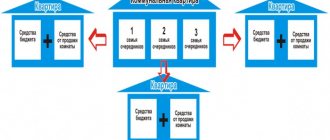Housing waiting list programs
The Russian government has developed several projects to improve the living conditions of citizens.
There are social programs that operate in the regions and Moscow, where there is a waiting list for apartments. Federal projects:
- Providing housing for young families. The program provides subsidies for the purchase of real estate.
- Housing for those displaced due to emergencies and unforeseen circumstances. Additional funding comes from the state budget.
- Programs for civil servants, military, police. These include mortgage lending at reduced rates. A person can extend the debt repayment period and postpone payments.
- Financial support for obtaining an apartment or house for residents of rural areas.
- Projects designed to allocate state apartments to low-income categories of citizens.
Social programs for Moscow residents:
- Writing off part of the mortgage debt upon the birth of a child. The provision applies to many types of projects.
- Reimbursement of expenses for renting a home. It is paid to persons recognized as needy, the amount is 50% of the average market price.
- Providing subsidies for the purchase or construction of housing.
- Social mortgage. An apartment owned by the city is offered at a reduced price. It depends on the cost of building the house and the length of time the buyer is in the apartment queue.
Article 51 of the RF Housing Code establishes a list of grounds upon the occurrence of which the right to be included in the queue arises. These include:
- The citizen does not have his own home or is in social rent. Such a condition affects not only the applicant, but also other members of his family. Moreover, only commercial rent is provided.
- A person acts as a tenant of a rental residential property under a tenancy agreement. In this case, the living space is less than the established standard for a certain subject of the state.
- The immovable property, which is owned, does not meet sanitary standards or fire safety, that is, it is recognized as in disrepair or included in the program for the demolition of dilapidated housing.
- The applicant lives in an apartment where another family lives and there is a sick person with an open form of the disease that can be infected and living with him is strictly prohibited.
- The living space must be at least 10 sq.m. In a situation where several family members are tenants under different rental agreements, the norm is calculated per 1 person in the total volume of all real estate.
Required Documentation
To register as a person in need of assistance in improving living conditions, you will need to prepare a package of certain documents. Queuing is carried out after submitting the following list of documents:
- Application in the prescribed form;
- Civil passport of the applicant;
- Technical plan of the premises drawn up by BTI;
- Certificate of arrears in payment of utility bills;
- Information from the house register about registered persons;
- Reference information confirming low-income status;
- An extract confirming or refuting the existence of the owner’s rights to the real estate;
- Certificates confirming the presence of serious illnesses, orphan status, certificates of participants in various wars, and more.
To register for housing, you need to bring a package of various papers:
- passports of all family members (photocopies of all pages);
- certificate of passport replacement (if the replacement has been carried out since 1991);
- military personnel identification card (for military);
- birth certificate (for children under fourteen years of age);
- marriage or divorce certificate;
- papers establishing paternity (if such a procedure was carried out);
- adoption certificate (if the child was adopted);
- certificate of name change (if any);
- certified copies of various court orders regarding the applicant's family members (if any);
- a document declaring the housing unfit for living (if the house is officially recognized as unsafe);
- papers confirming the availability of residential premises;
- income certificates for all family members;
- documents proving the right to receive benefits (Chernobyl certificate, papers confirming the presence of disability, etc.);
- passport and power of attorney of the representative (if the applicant acts through a third party).
Other options: straight away and honestly...
Orphans left without housing, demobilized and released native Muscovites after serving their sentences, old people and disabled people who returned their apartment to the city free of charge, as well as young families participating in the city program can be provided with an apartment under a free use agreement for 5 years. Upon expiration of the term, the contract is either extended, or citizens are provided with housing as part of social rent.
Those who registered for housing before 2005, and who have to live in a cramped and unbearable situation in the same premises with relatives, are given the opportunity to temporarily rent housing for 5 years from the commercial housing stock of the city of Moscow. The cost of payment is 1 sq.m. such housing is given in the Decree of the Moscow Government of November 30, 2010 No. 1038-PP “On approval of prices, rates and tariffs for housing and communal services for the population for 2011” and amounts to 4.63 rubles per month per square meter of total area on the ground floor in a building without an elevator or garbage chute up to 5.81 rubles on a good floor in a building with all amenities.
For houses located within the third transport ring, rent is twice as high. As a result, monthly payments for renting such an apartment are five to ten times higher than for a social rented apartment. However, the cost of housing in non-subsidized houses is ten times higher, but these amounts are still comparable to the cost of utilities and do not pose a problem for any family.
Grounds for removal from the queue
In accordance with the provisions of the Housing Code of the Russian Federation, the reasons for deregistration as a home in need of improvement are:
- Application for voluntary exclusion from the list of applicants;
- Increase in the average monthly income of a married couple;
- Change of low-income status;
- Change of place of residence of persons seeking help;
- Allocation of financial support from the budget to those in need for the purchase or construction of a residential property;
- Providing a plot of land allocated for the construction of a residential building;
- Knowingly providing false information during registration. For example, income certificates or an inaccurate number of people living in the same living space.
According to Art. 49 of the Housing Code of the Russian Federation, only low-income Russians who need improved conditions can count on free apartments:
- citizens living in dilapidated houses that do not meet standards and requirements;
- persons who do not own their own housing;
- families provided with an area less than the accounting norm.
- residents of communal apartments.
First of all
Citizens or families who urgently need to improve their housing can get a place in the queue earlier if two conditions are met:
- The apartment was declared unsuitable for use. The reasons are the wear and tear of the building, the presence of biological and chemical substances dangerous to humans, and increased radiation.
- Some of the residents have a severe form of a chronic disease from the list approved by the Russian government. This could be active tuberculosis, gangrene, lung abscess or epilepsy.
On a universal basis
The state queue for an apartment includes citizens who do not have advantages over others; to get there, the family must:
- Continuously reside in the territory of the selected Russian region for at least five years.
- Do not take actions to deliberately worsen living conditions.
- Have a disability or the status of a large family.
- Live in living space that does not meet the standards.
We invite you to familiarize yourself with: Life and health insurance when receiving a loan from Sberbank
Under these conditions, free square meters can be purchased by:
- participants in military operations and WWII;
- residents of emergency buildings;
- disabled children and orphans;
- persons living in communal apartments with people suffering from serious illnesses, when such proximity is contraindicated according to medical criteria;
- people who experienced loss of housing during natural disasters;
- judges and prosecutors;
- Intentionally providing false information.
- Change of place of residence.
- Purchasing a piece of land or real estate.
- The applicant's request to be removed from the queue.
A person may not only be denied housing registration, but in some situations may also be removed from the queue. Similar cases are listed in Article 56 of the country’s Housing Code:
- at the personal request of the applicant (by submitting an appropriate application);
- if, while waiting for his turn, a person has lost the grounds for obtaining living space;
- if he moved to another region (with the exception of the federal cities of Moscow, St. Petersburg and Sevastopol);
- if he received land from the state for the construction of a residential building;
- if it turns out that the official who accepted the appeal should not have done so due to the lack of compelling reasons;
- if it is revealed that the information submitted by the applicant does not correspond to reality.
After the decision to deregister is made, the applicant must be sent a notice within three working days, which he can challenge in court.
Who can count on benefits?
Here are the basic requirements for applicants for housing from the state in order of priority:
- Only citizens of the Russian Federation are registered.
- In the last 5 years, no deliberate actions should be taken to worsen living conditions.
- The family must be recognized as low-income. Total income and property (apartment, house, car) are taken into account. All this in total is compared with the cost of living in the region or with the price of the required apartment.
- Those in need of housing are those whose apartment or room is less than the accounting standards adopted in the region. It does not matter whether it is privatized or used as a social lease. All real estate is taken into account - both the one where the family lives and the one that is owned.
- A separate category is those whose housing does not meet the requirements for residential premises, that is, it is dilapidated, dangerous for living, or poorly equipped.
Subjects of the Russian Federation can make adjustments to the conditions by adding other categories of people in need. But this should not contradict the Housing Code. Such programs are financed by local budgets. The full list can be seen on the website of the administration of your region.
There are citizens who are provided with social housing out of turn:
- Living in a building that has been declared unfit for habitation and cannot be repaired.
- People suffering from severe forms of chronic diseases that make living together impossible and threaten others. These are tuberculosis, mental disorders, epilepsy with frequent seizures, gangrene, skin diseases with rashes and discharge.
- Orphans and children left without parental care.
- Residents of communal apartments. They can claim the vacant room of their neighbors as a priority.
If a building is being demolished, apartments should be given to residents out of turn.
The extraordinary order does not mean that the apartment will be given immediately after submitting the application. Only that it is earlier than the usual queues. Such beneficiaries are not assigned a serial number, but in fact there is a queue for them too, although it moves much faster.
There are also those who are given apartments one by one, but on a priority basis. Rules are set at the regional level. Most often these are large families, disabled people, combatants and rehabilitated persons who were once deprived of housing. This is usually called preferential queuing.
In St. Petersburg, 635 apartments were allocated to those on the waiting list for 2021. They were distributed among veterans, orphans and disabled people. Ordinary poor people did not receive any, although they wait longer. The situation is similar in other cities. In Vladivostok, just over 1,000 families are waiting for a free apartment. By the country's standards, there are not many, but there are approximately the same number of needy children from orphanages. They will be settled first, and then it will be the others’ turn.
Currently, the circle of citizens who have the opportunity to queue on a preferential basis is very limited. Housing legislation establishes such a right only for low-income families. But acquiring such status is not difficult. It is enough to apply with the necessary documentation to the social protection department of the population geographically located at the applicant’s place of residence.
By the way, an important requirement for registration as someone in need of improved housing conditions is a confirmed fact of residence in a particular region for more than 10 years. And the last of them must live in an apartment unsuitable for normal existence for more than 5 years.
Certain categories of citizens have the right to exercise the right to improve their housing without being placed on the waiting list. These are persons who:
- There are serious diseases. For example, mental disorders, tuberculosis, HIV and others;
- The living space has been duly declared unfit for habitation;
- I don’t have my own home for good reasons. These include citizens who have lost a guardian, adult children in orphanages, etc.
Social assistance can be expressed in various government programs that provide both the provision of housing and the improvement of family living conditions by issuing preferential mortgages, subsidies, compensation, etc.
In some cases, an applicant may be refused entry into the queue for housing:
- if the applicant has not provided all the necessary documents;
- if during verification the information provided turned out to be false and the papers were false;
- if he changed his citizenship;
- if the applicant has already received this type of government support;
- if he did not have enough rights to receive government assistance;
- if he deliberately worsened the conditions of the existing housing (for example, exchanged his real estate, the area of which did not violate the norm, for a less worthy one, or entered into a fictitious marriage);
- if he was evicted by a court decision from the housing he occupied under a social tenancy agreement due to non-compliance with the terms of the agreement;
- if the applicant died during the consideration of the application.
We invite you to read: Child support debt: repayment, payment procedure, amount, can it be returned?
How many square meters are allowed per person - living space standards
Hello! I live in Samara, in a barracks-type house where there is no hot or cold water, not to mention a bathroom and toilet, the area of our “golden” apartment is 33 m2, the housing is municipal and 10 of us are registered, of which 4 are minor children, one of which chest. Tell me, can we get on the waiting list for improved living conditions?
We recommend reading: Sample of forensic psychiatric examination
Hello Mikhail! According to the norms of housing legislation, when moving out of dilapidated and dilapidated housing, you will be provided with living space of equal size. That is, if, according to the technical plan, the area of the apartment is 20 sq.m., then you will be provided with living space of similar size. As for privatization, the privatization of dilapidated and emergency housing is impossible.
Refusal to queue
The opportunity to improve the lives of Russian families provides for various federal projects that allow socially vulnerable categories of people to receive significant government assistance in the provision of residential facilities or financial assistance for repair work, reconstruction or construction of their own home.
The document is prepared in writing in accordance with the instructions on the procedure for creating and maintaining accounting files. A sample of this can be found at the relevant organization.
The application contains information about:
- Housing conditions as of the date of submission of documents;
- Period of residence in the facility on the date of registration;
- Availability of benefits for priority and priority presentation of living space.
The application, along with the prepared documentation, is submitted to the appropriate department of the municipality. After submitting the package of documents, an inspection of the apartment is scheduled, based on the results of which a report on the study of living conditions is drawn up. The document is the basis for a final verdict on inclusion in the queue or refusal, formalized by a resolution of the relevant organization. This decision can be appealed in court or in the Office of the Department of Housing Policy.
The grounds for refusal to register are described in Art. 54 Housing Code of the Russian Federation. Formally, they consist in the fact that the necessary documents have not been submitted. In essence, the person has not confirmed his right to join the queue or does not meet the requirements.
Refusal will be reported in writing with an explanation of the reasons. They must strictly comply with the law; free interpretation is unacceptable.
Re-registration of waiting lists is carried out regularly. In different regions of the Russian Federation, the deadlines may differ, but it is worth focusing on the annual review of cases.
They can be deregistered if those on the waiting list:
- submitted an application for deregistration;
- lost the basis for obtaining an apartment (for example, due to a change in the composition of residents, an increase in income);
- moved to another region;
- received a government subsidy for housing;
- received from the state a plot of land for the construction of a residential building (with the exception of large families);
- presented false documents.
If such circumstances are identified, the person is deregistered within up to 30 working days. He is notified of this within 3 days. And it doesn’t matter whether he’s been waiting in line for several months or many years.
If you decide to take an apartment off the waiting list, there must be a legal justification for this
If a person deliberately created a situation in order to be considered in need of housing, placement on the waiting list is possible only 5 years later (Article 53 of the Housing Code of the Russian Federation). Such actions include transferring or exchanging one’s property, moving to a lower-paid position, or moving in other tenants. The birth of children and the registration of a spouse in his apartment are not included in this list.
Otherwise there are no restrictions. You can join the queue again at any time.
A complaint about specific actions of officials can be submitted to their management or to a higher organization. This is appropriate when they make illegal demands for documents, delay deadlines, or extort money. The appeal will be considered within 15 days and a written response will be given.
Refusal to register and removal from the queue can be appealed in court. The claim is filed in civil proceedings in a court of general jurisdiction. The maximum period is 3 years from the date of receipt of the notification.
Problems with registration arise rarely. It’s much more difficult to stay in line and wait for an apartment. Administrations often remove families from registration on flimsy grounds or without a detailed explanation of the reasons at all. There is a practice of successful appeals in such situations.
It can be difficult to fight government agencies alone. Lawyers, human rights activists, public organizations and the media help with this. Sometimes publicizing violations works much better than standard methods of appeal.
People on the waiting list in Moscow organize rallies and pickets in defense of their rights.
If the family is low-income and needs improved living conditions, you can join the queue for an apartment. It's free and doesn't oblige you to anything. Unless you have to regularly confirm your right. Another question is that the wait stretches for decades. But during this time you can try to solve the housing problem in another way.
- Russian citizenship.
- Permanent residence with registration for at least a specified period, which depends on the region of the country. For Moscow this period is 10 years.
- Recognition of the applicant as low-income.
- Five years before submitting an application to be placed on the waiting list, there must be no real estate transactions that would lead to a deterioration in living conditions. The commission will pay attention to whether there was an allocation of a share of the apartment, a gratuitous transfer or its unprofitable sale.
Low income status
A single citizen or a family can obtain municipal housing. To get in line, you must document your low-income status.
To obtain it, you must contact employees of the local social welfare department with an application and a package of required documents.
The condition for establishing status is that a person’s income is less than the subsistence level of a certain region. If at least one member of a family does not want to work, it is not recognized as poor.
We invite you to familiarize yourself with: In what shares is the inheritance divided between the heirs of the first stage?
Living space standard
To be placed on the waiting list for an apartment, a citizen will have to prove that he needs expansion and additional square meters. One of the indicators is the real area per person, which is lower than the accounting norm.
This value is calculated individually for a separate subject of the Russian Federation.
It depends on the minimum area of apartments, houses or other residential premises.
The standard was developed and approved by local authorities. The indicator may differ even within one region of Russia. Low-income Muscovites can get on the housing queue if the area is less than 10 m2 for individual apartments, 15 for communal ones.
For regions, this value is often from 9 to 12 m2.
A citizen can receive a free apartment out of turn if he lives in a dilapidated building. For each region, a program has been developed for resettlement from premises unsuitable for further residence. This does not mean improved conditions. How many meters there were for one person, so much will remain after the move. Accounting standards do not apply here.
It is important to know that dilapidated housing cannot be resettled. Although it is uncomfortable, it is not dangerous for stay and does not threaten people’s health.
Those in need of housing: grounds for improving housing conditions and registration
According to the new standards for the distribution of housing to those in need, a citizen of the Russian Federation can receive social housing (15-20 square meters per person), taking into account the deduction of the square meters available in his personal property at the time of filing the application. For example, a family of three applies for social housing. According to legislative standards, this family can be provided with an apartment or house with an area of 45-60 square meters. meters. But if one of the family members has their own living space, say, 20 square meters. meters, then the family can only apply for social housing with a total area of no more than 25-40 square meters. meters.
We recommend reading: If a pensioner has two apartments, should he pay property tax?
If previously a family was in line to improve their living conditions and had children, then after a child from this family came of age, he could, with the rights of a full citizen of the Russian Federation, separately apply for improvement of his housing. In other words, the queue was divided, but not from the moment the child came of age, but from the time when his parents or guardians initially registered for housing improvement.
Procedure
To get on the waiting list for social housing, you must:
- obtain low-income status;
- clarify the list of required documents and collect them;
- submit an application and a package of papers to local government officials;
- wait for the decision of the special commission;
- receive a written positive or negative response.
Where to contact
A citizen who decides to improve their living conditions and join the queue must contact the local government authorities at the place of registration. This can be done by visiting the branch in person, on the official website of the administration, or by sending an application via email.
Additional options to submit documents for queuing:
- Fill out an application and submit copies of papers online on the State Services portal.
- Visit the Multifunctional Center (MFC).
Submission of documents
For each specific case, a certain package of papers will be required. Before collecting documents, it is recommended to clarify the list.
Standard list of papers:
- a statement signed by all family members;
- passports of the applicant and adults with copies of the required pages;
- documents confirming the status of low-income people and the need for housing;
- evidence of family ties (marriage, divorce, birth certificates, court decision on guardianship);
- extract from the house register;
- a certificate from the Unified State Register confirming that the applicant and his family members do not have real estate.
Terms of consideration
A specially created commission reviews the documents submitted by the citizen and makes a decision within 30 days. Three days after this, the applicant is sent a written notification.
It may contain confirmation of registration or a justified refusal.
Rules for placing on the waiting list for improved housing conditions
After filing a claim, a hearing will be scheduled in court. If the decision is positive, the plaintiff will be required to be reinstated in the queue for improved housing conditions, otherwise the court will refuse to satisfy the demands. If the decision is negative, the plaintiff has the right to appeal to higher courts.
- make an application to the housing department. Moreover, it must be written in several copies. One remains in the housing department, and the second with the applicant (when placed in line);
- send a registered letter to the housing department. As a rule, the answer will come after 30 calendar days;
- by personal contact with local authorities. Each applicant has every right to find out the information he needs about the progress of the queue.
Types of state aid
State aid can be provided in different ways:
- in the form of housing transferred for use under a social rental agreement;
- in the form of a certificate for the purchase of a residential property;
- in the form of a social mortgage loan.
The first way to get free housing is to enter into a social rental agreement and receive an apartment, part of it, a room, etc. for use. The housing space is provided for an unlimited period. In turn, the citizen who received such housing is obliged to pay for it on time, as well as pay for utilities.
For a person who needs to improve their living conditions, the state can provide a subsidy for the purchase of new real estate. The amount that can be given to a citizen is a certain proportion of the standard cost of square meters allocated to the family, and depends on the period during which they had to wait their turn. Those who have waited only a year can count on a 5% discount. 70% are those whose turn came after ten years or more.
The size of the purchased living space must be at least 18 square meters for each resident. If a family consists of only two people, they are entitled to 42 square meters. If someone from the family is sick with a severe form of chronic illness, a separate room should be allocated for him. As for family members of different sexes, all of them (with the exception of the wife and husband) must live in separate rooms, unless they give written consent to live together in the same room.
Young families can take part in the “Affordable Housing for Young Families” program, which assumes that part of the mortgage loan for the purchase of a house or apartment is paid by the state. The age of the spouses should not exceed 35 years. Moreover, all family members must have Russian citizenship and permanent residence in the region where the application is submitted.
Many Russian citizens can receive from the state, if not free housing, then significant financial assistance in purchasing it. The main conditions are to really need housing, to be a recipient of benefits, or to have outstanding services to the country. However, assistance is not automatically assigned. To receive it, you need to collect an extensive package of documents proving your right to the benefit, submit the appropriate application and wait for a positive response.
A positive answer does not mean that the applicant will be immediately given residential premises. The waiting period can be as long as a year or as long as ten years (or even more).
There's no turning back
Those on the waiting list for free housing, if their financial situation or family composition changes, can switch to the category of “those in need of city assistance” to paid forms, while maintaining the year of placement. The transition procedure is defined in Moscow government decree No. 91-PP dated February 10, 2009.
But the reverse transition from the paid queue to the free one while maintaining the date of entry is not provided. As a low-income person, such a person on the waiting list must register again, since there is a whole stage of verification of his financial viability in the social protection authorities.
By the way, since the division of the queue into new and old, the emergence of new categories of waiting lists, about two thousand families recognized as needing residential premises as low-income, as well as 300 families needing the city’s assistance in purchasing residential premises, have been registered in the Northern District. In total, the waiting list for the Northern Administrative District numbers approximately 14 thousand families.
On a note
Reception of those on the waiting list recognized as needing the city's assistance in purchasing residential premises is carried out at the Department of Housing Policy and Housing Fund in the Northern District every day, except Tuesdays, from 9.00 to 18.00, on Fridays - from 9.00 to 16.45, lunch break - from 13.00 to 14.00 . Address: Solomennaya Storozhki passage, 8, room. 21.
The necessary regulations can be found on the website of the Department of Housing Policy and Housing Fund of the City of Moscow.
Tatiana Ushanova
How long to wait to receive housing
The queue for a free apartment moves very slowly. When new priority applicants appear, there is a possibility of a rollback. The waiting period for housing depends on the region. For some it is 5–6 years, for others it reaches 20.
Together with the positive decision, the applicant will learn his initial place on the lists. Over time, the serial number of the queue for housing changes - it becomes larger or smaller.
There are three ways to find out your place:
- during a personal visit to the administration of the subject;
- by applying in writing via Russian Post;
- by looking at your number by visiting the regional government website.
Who can get in line to receive a plot of land?
The basic requirements for those who wish to queue for are the following points:
- All persons in the family must have Russian citizenship;
- The family must have at least 3 minor children, while adopted and adopted children are not taken into account;
- There may be disabled participants in the Great Patriotic War in the family;
- Parents must be legally married;
- All children must be registered with their parents;
- At least one of the spouses must live for at least 5 years in the area in which the land is expected to be received.
The plot is provided free of charge and free of charge from state or land. The location of the land plot and its area are selected directly by the self-government body.
The size of the land, depending on the region, can be from 6 to 15 acres.



![Mortgage for civil servants and other public sector employees in Sberbank in [year]](https://2440453.ru/wp-content/uploads/ipoteka-dlya-gossluzhashchih-i-drugih-byudzhetnikov-v-sberbanke-v-year4-330x140.jpg)



